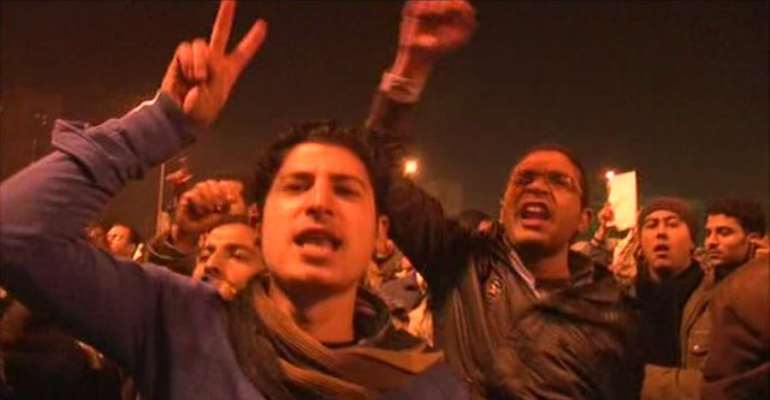PROTESTERS REJECT MUBARAK SPEECH

Hundreds of thousands had gathered across the country in the biggest rally since protests began last week.
US President Barack Obama said an orderly transition “must begin now”.
In a statement after Mr Mubarak's address, Mr Obama said the US would be happy to offer assistance to Egypt during that process.
At the scene
Yolande Knell BBC News, Cairo
The crowd went quiet as the president's speech was projected on a huge sheet hung up on the side of an apartment building in Tahrir Square.
Quickly, though, exclamations of disbelief rang out. “What, he's still not going to leave?” said one young demonstrator, with his hand to his brow.
As the speech ended, further angry cries of “irhal – go!” erupted.
Protesters had made the same simple demand throughout the day. “We feel rage. He totally ignored what we were asking for,” said one man, summing up the mood.
“We must be careful,” added another, thinking of how democracy activists have been treated in the past. “If Mubarak stays in power until September, he will punish us. He will torture us”.
Only a few people walking away from the square after a long day of protest thought they had won significant concessions. It remains to be seen how households across Egypt will react.
But opposition leader Mohamed ElBaradei dismissed Mr Mubarak's move as “a trick” to stay in power, and protesters in Cairo's Tahrir Square have vowed to continue their demonstrations until Mr Mubarak quit.
'Inflames anger'
After Mr Mubarak's announcement, some in central Cairo chanted: “We will not leave! He will leave!”
Abdelhalim Kandil, leader of Egypt's Kifaya (Enough) opposition movement, said Mr Mubarak's offer not to serve a sixth term was not enough.
“I will tell you very simply that there is an unprecedented popular movement that rejects the presence of the president on a scope that has not been seen before, that is calling for the will of the people to be imposed,” he said.
If Mr Mubarak does not step down, demonstrators are planning to march on the presidential palace.
About 300 people have died so far in protests, according to the UN.
White House reaction
US President Obama said he had spoken to Mr Mubarak and the Egyptian leader understood “change must take place”
The transition must “begin now”, should include opposition voices, and lead to free and fair elections
The US would “continue to extend the hand of partnership and friendship to Egypt” and provide assistance
The US leader also praised the Egyptian army for allowing the demonstrations, as well as the “passion and dignity” of the protesters
Some demonstrators said they did not trust their 82-year-old leader to enact the necessary constitutional changes.
“The speech is useless and only inflames our anger,” one protester, Shadi Morkos, told Reuters. “We will continue to protest.”
However, other Egyptians said they believed that Mr Mubarak's offer could be a suitable compromise.
Omneya Okasha, a resident from Alexandria, told the BBC she believed that sudden change could lead to “more drastic consequences”.
“I find this a stable solution something that suits both sides – a win-win situation. But a lot of people will still protest and they will still want him to leave,” she said.
'Restore peace'
http://www.bbc.co.uk/news/world-middle-east-12342215#story_continues_4
In his address on Tuesday, Mr Mubarak said he would devote his remaining time in power to ensuring a peaceful transition of power to his successor.
He criticised the protests and said his priority was to “restore peace and stability”.
“This is my country. This is where I lived, I fought and defended its land, sovereignty and interests, and I will die on its soil,” he said.
In a short statement, Mr Obama said that it was not his country's right to dictate the path for Egypt, but that any transition must include opposition voices and lead to free and fair elections.
“It is my belief that an orderly transition must be meaningful, it must be peaceful and it must begin now,” Mr Obama said he had told Mr Mubarak during a 30-minute phone call between the leaders.
